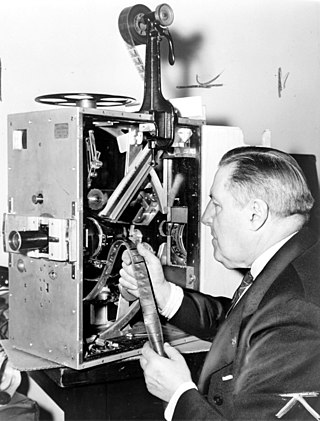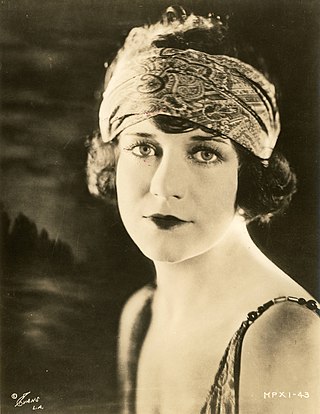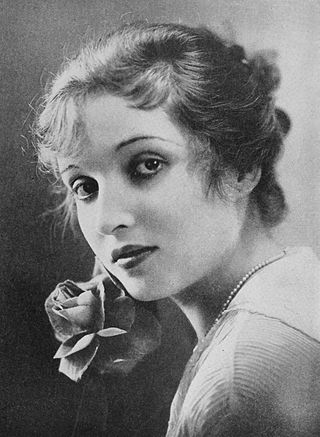Related Research Articles

Gottfried Wilhelm Bitzer was an American cinematographer, notable for his close association and pioneering work with D. W. Griffith.

Viola Dana was an American film actress who was successful during the era of silent films. She appeared in over 100 films, but was unable to make the transition to sound films.

Alice Joyce Brown was an American actress who appeared in more than 200 films during the 1910s and 1920s. She is known for her roles in the 1923 film The Green Goddess and its 1930 remake of the same name.

Charles G. Rosher, A.S.C. was an English-born cinematographer who worked from the early days of silent films through the 1950s.

Harold A. Lockwood was an American silent film actor, director, and producer. He was one of the most popular matinee idols of the early film period during the 1910s.

Mae Marsh was an American film actress whose career spanned over 50 years.

Josephine M. Workman better known by her stage name, Princess Mona Darkfeather was an American actress who starred in Native American and Western dramas. During the silent era of motion pictures, from 1911 to 1917, she appeared in 102 movies. She is best known for her role as Prairie Flower in The Vanishing Tribe (1914).

Carlyle Blackwell was an American silent film actor, director and producer.

Stuart Holmes was an American actor and sculptor whose career spanned seven decades. He appeared in almost 450 films between 1909 and 1964, sometimes credited as Stewart Holmes.

Marie Eline was an American silent film child actress and sister of Grace Eline. Their mother was an actress.

Albert Edward Coxen was an English-born American actor. He appeared in over 200 films during his career.

Stanner E.V. Taylor was an American screenwriter and film director of the silent era. He wrote for more than 100 films between 1908 and 1929.

Charles West was an American film actor of the silent film era. He appeared in more than 300 films between 1908 and 1937. He was born in Pittsburgh, Pennsylvania, and died in Los Angeles, California.

Shirley Mason was an American actress of the silent era.

James Young Deer, also known as J. Younger Johnson or Jim Young Deer, was actually born James Young Johnson in Washington, D.C. Although he was identified in the early Hollywood trade paper Moving Picture World as of the Winnebago Tribe of Nebraska, his ancestry is of the Nanticoke people of Delaware. He became an early film actor, director, writer, and producer. He is believed to be the first Native American filmmaker/producer in Hollywood. Together with his wife and partner Lillian St. Cyr, Winnebago, the couple were labeled an "influential force" in the production of one-reel Westerns during the first part of the silent film era. Their films, along with several others of the silent era, were notable for portraying Native Americans in a positive light.
The Treasures from American Film Archives series of DVDs is produced by the National Film Preservation Foundation (NFPF), a nonprofit organization created by the U.S. Congress in 1997. The NFPF publishes these DVD sets, with accompanying booklets and extensive commentary, to promote public access to the films preserved by the American archival community.

Barriers of Society is a 1916 American silent drama film directed by Lloyd B. Carleton. Universal based the film on the story written by Clarke Irvine and adapted for the screen by Fred Myton. The feature film stars Dorothy Davenport, Emory Johnson, and an all-star cast of Universal contract players.

The Yaqui is a 1916 American silent Black and white Melodrama directed by Lloyd B. Carleton and starring Hobart Bosworth, Gretchen Lederer and Emory Johnson. The film depicts Yaqui Indians entrapped by nefarious elements into enslavement for a wealthy plantation owner. They struggle in captivity, eventually rebelling against their owner's oppression.

The Dawson Film Find (DFF) was the accidental discovery in 1978 of 372 film titles preserved in 533 reels of silent-era nitrate films in the Klondike Gold Rush town of Dawson City, Yukon, Canada. The reels had been buried under an abandoned hockey rink in 1929 and included lost films of feature movies and newsreels. A construction excavation inadvertently uncovered the forgotten cache of discarded films, which were unintentionally preserved by the permafrost.

Heartaches is a 1916 American silent short film directed by Lloyd B. Carleton. The film is based on a story by Grant Carpenter. This drama's features Dorothy Davenport, Alfred Allen, and Emory Johnson.
References
- ↑ "Detail view of Movies Page". Afi.com. Retrieved 11 January 2015.
- ↑ "Virginia Chester (1896 - 1927) - Find A Grave Memorial". Findagrave.com. Retrieved 11 January 2015.
- 1 2 Hal Erickson (2016). "Yaqui-Girl - Trailer - Cast - Showtimes - NYTimes.com". Movies & TV Dept. The New York Times . Baseline & All Movie Guide. Archived from the original on 6 March 2016. Retrieved 11 January 2015.
- ↑ "The Yaqui Girl (1910)". IMDb. 31 December 1910. Retrieved 11 January 2015.